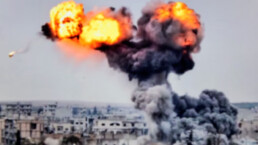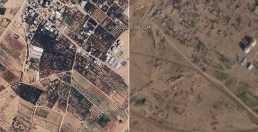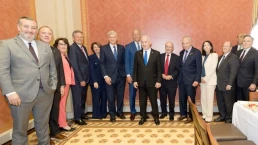How America hides the human toll of its military machine.
By Norman Solomon, The Nation
The physical and psychological distances of high-tech killing have encouraged belief in frequent claims that American warfare has become humane. Such pretenses should be grimly absurd to anyone who has read high-quality journalism from eyewitness reporters like Anand Gopal, who worked in Afghanistan for several years while often going to remote areas, bringing into focus lives usually relegated to US media’s unseen shadows. Civilian deaths were “grossly undercounted” during the 20-year US war in Afghanistan, Gopal said during an interview on Democracy Now! soon after the withdrawal of US troops from that country in August 2021. With 70 percent of the Afghan population living in rural areas, Gopal was one of the few reporters for US outlets to spend a lot of time there—particularly in such places as the large Helmand Province in southern Afghanistan, “really the epicenter of the violence for the last two decades.”

This spring, estimates from the Costs of War project at Brown University averaged 375,506 for civilians “killed directly in the violence of the US post-9/11 wars in Afghanistan, Pakistan, Iraq, Syria, Yemen and elsewhere,” while “several times as many more have been killed as a reverberating effect of the wars.” But the US government is not oriented toward counting such numbers. Civilian anonymity cuts against accountability.
With extremely rare exceptions, the people killed and maimed by the US military aren’t on American screens or in print; their names are unknown, their lives a blank of un-personhood. In aggregate, those lives must remain impersonal and insignificant if war efforts are to go on unimpeded. By dint of repetition compulsion, with virtual distancing in a hype-digital era, making war has taken on a life, and death, of its own; doing more than just blending in with the everyday, the normalized fatal violence disappears from view for all who are insulated from its cruelties.
In the late summer of 2021, Yale professor Samuel Moyn made a splash with Humane: How the United States Abandoned Peace and Reinvented War. The new book was well documented on legal issues related to war, and the author provided thoughtful analysis of some anti-war efforts from the 19th century to the present. But even while warning that US warfare since 9/11 was set to be perpetual, he asserted that it had become “humane.” In the process, the book repeatedly made assertions that would seem preposterous to people living in Iraq or Afghanistan.
In an opinion piece that The New York Times printed when his book came out, shortly after United States forces left Afghanistan, Moyn wrote flatly: “With the last American troops now out of the country, it is clearer what America’s bequest to the world has been over the past twenty years: a disturbing new form of counterterrorist belligerency, at once endless and humane. This has transformed American traditions of war-making, and the withdrawal from Afghanistan is, in fact, a final step in the transformation.”
For all his sophistication and nuanced analysis, Moyn’s outlook is typical of a person insulated from the human realities of war. Seemingly complacent about those realities in the present day, he accepts the chronic discounting and undercounting of deaths and injuries from recent and ongoing US warfare. And Moyn bypasses the longer-term effects of the United States’ 21st-century wars—including the decimation of entire societies and nations; the cascading results of all the killing and maiming and the crushing of infrastructure from health care to education to housing; the ecological destruction; the spiritual desecration; the terror imposed on daily life for years on end.
Such terror includes knowing that the sound of an approaching drone could mean imminent death. Yet one can read in Humane that “for all their faults, it is also true that drones are increasingly the cleanest mode of war ever conceived. They hover nearby and, when they attack, do so with painstaking real-time targeting in the name of precision and thus civilian care.” And: “The American way of war is more and more defined by a near complete immunity from harm for one side and unprecedented care when it comes to killing people on the other.” Overall, Moyn fuels a pernicious myth that US wars can now be understood as somehow close to benign, even while he knows and occasionally notes otherwise. The professor ends up grading US wars on a curve, giving them increasingly high marks the farther they are from the carnage in Southeast Asia during the 1960s and ’70s.
From Vietnam to Afghanistan, the official pretense from the commander in chief was that America’s brave troops—imbued with the nation’s highest ideals—were on a humane mission.
“No American army in all of our long history has ever been so compassionate,” President Lyndon Johnson told thousands of troops who assembled to hear him at Cam Ranh Bay in Vietnam on October 26, 1966. Nearly 50 years later, the themes of President Barack Obama’s oratory to troops in Afghanistan were strikingly similar. In fact, both of those presidents could have delivered the bulk of each other’s speeches without changing a word.
“The troops” as a single entity has been useful in many a political story. It’s not necessary to question the sincerity of a politician who heaps reverent praise on the troops to recognize that servicemen and -women are often invoked to personify the pursuit of war policies that they had no role whatsoever in devising or approving; they are not partners but props and pawns for Washington’s officialdom, which uses them in public relations dramas and battles over policy as war drags on. And, as with Johnson’s “compassionate” claim, officials often strive to depict the troops as angels of mercy rather than killers.
Barack Obama was just 5 years old when Johnson spoke, yet the continuity between their speeches in Vietnam and Afghanistan would end up being almost seamless. They were basically saying the same thing to the troops—you are great; keep fighting; the folks back home are proud of you, and they profoundly appreciate your noble sacrifices to protect the lives of the innocent. The momentum of such adulation easily leads to the idea that America’s troops engage in warfare with exemplary benevolence.
On March 28, 2010, Obama made his first presidential trip to Afghanistan. The visit was a surprise, adding to the dramatic impact. Speaking to 2,000 assembled troops, Obama took a deep dive into exaggeration and flattery. “I want you to know that everybody back home is proud of you,” he said.
Everybody back home is grateful…. And all of you represent the virtues and the values that America so desperately needs right now: sacrifice and selflessness, honor and decency. That’s what I see here today. That’s what you represent.
Two years later, Obama was back at Bagram Air Base. He gave an 11-minute speech, which began by declaring that “here, in Afghanistan, more than half a million of our sons and daughters have sacrificed to protect our country.” Perhaps no one could question Obama’s sincerity when he said that “as president, nothing is more wrenching than signing a letter to a family of the fallen, or looking into the eyes of a child who will grow up without a mother or father.” And he certainly sounded high-minded:
Today, we recall the fallen and those who suffered wounds, both seen and unseen. But through dark days, we have drawn strength from their example and the ideals that have guided our nation and led the world—a belief that all people are treated equal and deserve the freedom to determine their destiny. That is the light that guides us still.
But, decade after decade, such guiding light has led to ghastly results.
Sitting in a wheelchair in January 2006, 38 years after his combat duties suddenly ended on a Vietnam battlefield, Ron Kovic wrote a cri de cœur with questions that authorities and mass media showed no signs of wanting to really hear, much less answer, as the Iraq War neared the end of its third year: “Do the American people, the president, the politicians, senators and congressmen who sent us to this war have any idea what it really means to lose an arm or a leg, to be paralyzed, to begin to cope with the psychological wounds of that war? Do they have any concept of the long-term effects of these injuries, how the struggles of the wounded are only now just beginning?”
Kovic was living realities of war that were off the media maps, banished beyond the margins of teleprompters:
This is the part you never see. The part that is never reported in the news. The part that the president and vice president never mention. This is the agonizing part, the lonely part, when you have to awake to the wound each morning and suddenly realize what you’ve lost, what is gone forever. They’re out there and they have mothers and fathers, sisters and brothers, husbands and wives and children. And they’re not saying much right now. Just like me they’re just trying to get through each day. Trying to be brave and not cry.
As for people on the receiving end of US military prowess—civilians or, even more objectified, the fallen among enemy forces—within American media, they don’t amount to much more than trees falling unseen and unheard in a forest. This generalization does not contradict the instances of high-quality, against-the-grain journalism that sometimes appears even in media outlets with wide reach. Exceptional stories and commentaries are, well, exceptions. And the exceptions, while they can be quite valuable, are not the essence of propaganda. Repetition is.
News that discredits elite managers of the war system can startle and shake things up for a brief time, sending damage-control mechanisms into overdrive. It might seem that the status quo has been jerked away from its moorings. But such tempests blow over, leaving little changed. Sometimes, in the process, high-ranking officials get slapped on the wrist. They might even be tossed overboard.
After fulsome presidential praise as the new leader of US armed forces in Afghanistan, two multi-starred generals in succession—Stanley McChrystal and then David Petraeus—were hoisted onto clouds of media adulation before crashing to earth and losing their exalted positions. Those four-star heroes lost their pinnacle posts for reasons that had nothing to do with the deaths of civilians or anyone else during their commands.
McChrystal was a media darling from the moment he took charge of all US forces in Afghanistan during the late spring of 2009. Hailed as bluntly outspoken, he also generated plenty of admiring stories about his spartan rigor. A New York Times profile led off this way:
You have to marvel at how Lt. Gen. Stanley A. McChrystal, a former Special Operations commander and the newly appointed leader of American forces in Afghanistan, does it. Mastermind the hunt for al Qaeda in Iraq and plot stealth raids on Taliban strongholds in the Hindu Kush while getting just a few hours of sleep a night, exercising enough to exhaust a gym rat and eating one meal a day to avoid sluggishness. One meal. Who was it who said an army runs on its stomach?
And so it went, with media gushing at General McChrystal’s acetic stamina and tireless grit—till he stepped over an unacceptable line, not because he was overseeing a military force killing and terrorizing too many civilians, but because he said negative things to a Rolling Stone reporter about people in the Obama administration as high up as Vice President Joe Biden.
When the magazine quoted McChrystal’s indiscreet comments in an article, Obama relieved the general of his command. A dozen years later, when Obama’s memoir appeared, the book clarified that the firing was due to concern about McChrystal’s display of “impunity.” The former president explained this way:
[I]n that Rolling Stone article, I’d heard in him and his aides the same air of impunity that seemed to have taken hold among some of the military’s top ranks during the Bush years: a sense that once war began, those who fought it shouldn’t be questioned, that politicians should just give them what they ask for and get out of the way. It was a seductive view, especially coming from a man of McChrystal’s caliber. It also threatened to erode a bedrock principle of our representative democracy, and I was determined to put an end to it.
To the president, the general’s only unacceptable “air of impunity” had to do with a lack of respect for America’s diplomats and elected leadership. The air of impunity from a military commander toward Afghan lives was another matter entirely.
Norman Solomon is the executive director of the Institute for Public Accuracy, the author of War Made Easy, and a cofounder of RootsAction.org.
Recent Posts
What To Do When You See ICE In Your Neighborhood
July 14, 2025
Take Action Now How can you deter the Trump administration’s immigrant deportation machine when it pops up in your community? Follow these…
ICE Campaign Of Violence Will Lead To More Deaths
July 14, 2025
Take Action Now Jaime Alanis’s death shows the horrific consequences of a secret police force behaving with utter impunity.By Natasha Lennard, The…
Hague Group: “Concrete Measures” or Sack of Cement? Will It Move to Sanctions, Peace Force and Ensuring Aid to Gaza?
July 13, 2025
Take Action Now Will the meeting in Colombia be a coalescence of global opinion driving states to just action — or just more rhetoric from various…
Why Are Democratic Lawmakers Still Meeting With Netanyahu?
July 12, 2025
Take Action Now Pictures show Democrats like Chuck Schumer standing next to Netanyahu, smiling.By Sharon Zhang, Truthout A bipartisan group of…




